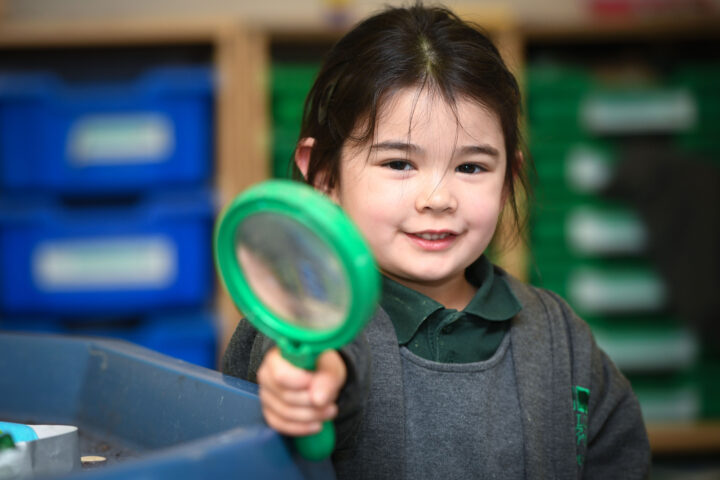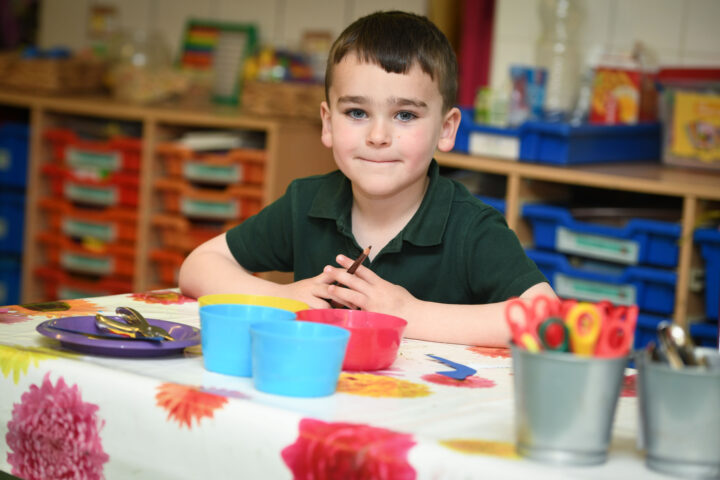Science

Science
At Hill West, we passionately believe that science should be inspirational, exciting and investigational. We encourage children to ask and answer questions about the world in order to develop their understanding of the world. We nurture their curiosity and teach essential skills of working scientifically to make them better informed, deep thinkers and active investigators. By teaching science through our bespoke curriculum alongside subject specific lessons, we ensure that Science is placed in a ‘motivating, real-life context’, through which children can also develop and improve skills across the rest of the curriculum, including English and Maths. By learning about Science through ‘hands-on’, engaging investigations, Hill West children will develop into informed adults, who can use what they know about science to help them make sense of the world and to be responsible world citizens.

The importance of Science
Science, as a core curriculum and STEM subject, is widely accepted to be of critical importance to the future international competitiveness of the UK. STEM employees play a key role in driving a countries productivity, growth and higher living standards for its people (UK COMMISSION FOR EMPLOYMENT AND SKILLS – Reviewing the requirement for high level STEM skills; Evidence Report 94; July 2015). The future UK economy urgently requires a larger proportion of the workforce to possess high levels of scientific and technological skill. Our country needs more students to continue to study science subjects beyond the statutory curriculum and move into related employment. If we enthuse and inspire our children to study science at Hill West, we will help to secure the economic future of our country – a key government priority.
Through our provision of high quality science teaching and learning, we will ensure that children at Hill West experience inspiring science that builds their understanding of the value and place of science in their lives. This will lay a foundation for their future studies, enabling them to make well-informed decisions in our increasingly technical world and give them access to a wide range of rewarding careers.
Our scheme of work for science is interwoven with cognitive science concepts, which ensures that children are taught the ‘right’ knowledge sequentially, making explicit links between content where relevant. The planning ensures that children will experience regularly planned opportunities for spaced practice, when key content will be re-taught. It also ensures that children will have frequent opportunities to practice retrieval of key information. Our scheme of work for each year group sets out opportunities for children to apply and practice key content and skills in a variety of contexts, so that they can store knowledge appropriately in their long-term memory. The development of this knowledge-engaged science curriculum, with an emphasis on hands-on learning, detailed exploration opportunities, and chances to apply knowledge and understanding through developing working scientifically skills, will result in children knowing more and remembering more, which aligns seamlessly with the government’s revised national curriculum, published in 2014.
The Early Years Foundation Stage Curriculum
A love of science is fostered and instilled in all our children. During the Early Years Foundation Stage, activities are planned in relation to objectives outlined in “Understanding the World”, with children’s progress assessed against the Early Learning Goals at the end of Reception. Our children are provided with learning experiences which help them make sense of the everyday world around them, whilst developing skills of observation and questioning.

The National Curriculum for science
The aims of the national curriculum are that all children will develop scientific knowledge and conceptual understanding through the specific disciplines of biology, chemistry and physics. They will also develop understanding of the nature, processes and methods of science through different types of science enquiries that help them to answer scientific questions about the world around them. Children must be equipped with the scientific knowledge required to understand the uses and implications of science, today and for the future. The curriculum is separated into two parts, which must not be taught separately.
Scientific knowledge and conceptual understanding
The programmes of study describe a sequence of knowledge and concepts. While it is important that pupils make progress, it is also vitally important that they develop secure understanding of each key block of knowledge and concepts in order to progress to the next stage. Insecure, superficial understanding will not allow genuine progression: pupils may struggle at key points of transition (such as between primary and secondary school), build up serious misconceptions, and/or have significant difficulties in understanding higher-order content.
Pupils should be able to describe associated processes and key characteristics in common language, but they should also be familiar with, and use, technical terminology accurately and precisely. They should build up an extended specialist vocabulary. They should also apply their mathematical knowledge to their understanding of science, including collecting, presenting and analysing data. The social and economic implications of science are important but, generally, they are taught most appropriately within the wider school curriculum: teachers will wish to use different contexts to maximise their pupils’ engagement with and motivation to study science.
The nature, processes and methods of science
‘Working scientifically’ specifies the understanding of the nature, processes and methods of science for each year group. ‘Working scientifically’ should be embedded within the content of biology, chemistry and physics, focusing on the key features of scientific enquiry, so that pupils learn to use a variety of approaches to answer relevant scientific questions. These types of scientific enquiry should include: observing over time; pattern seeking; identifying, classifying and grouping; comparative and fair testing (controlled investigations); and researching using secondary sources. Children are expected to seek answers to questions through collecting, analysing and presenting data. ‘Working scientifically’ will be developed further at secondary school, once children have built up sufficient understanding of science to engage meaningfully in more sophisticated discussions of experimental design and control.
The national curriculum sets out expectations for teaching and learning of scientific knowledge and understanding and the ‘Working Scientifically’ skills by key stage and year group. This has been distilled into our Science Learning Journey, which sets out what children are expected to be able to do by the end of each year.
